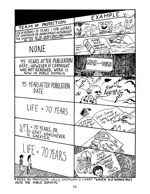 Let’s say I’m at work and I overhear some great dialogue. Can I use it, or should I worry about my co-workers suing me when they hear it in my movie?
Let’s say I’m at work and I overhear some great dialogue. Can I use it, or should I worry about my co-workers suing me when they hear it in my movie?
— Kobe
via imdb
Use it. Just as a photographer freely captures the visible world with a lens, a writer needs to record not just what people say, but how they say it. Ninety-nine percent of the spoken word is lost forever, which mean you have the liberty, nay, the obligation to poach dialogue from real life.
Just don’t be a dick about it. There’s a moral equivalent of the “fair use” law: don’t take whole speeches, and don’t leave in details that would reveal who the real-life speaker was. Also, keep in mind that certain co-workers might be writers themselves. If Witty Writer says something clever, there’s a good chance she’s going to want to keep it for herself. And she should.
 ](http://johnaugust.com/Assets/publicdomain.jpg)It seems every fourth question I get has the word “rights” in it: “Do I need the rights to…”, “How do I get the rights to…”, “Im not a gud speller I like to rights…”
](http://johnaugust.com/Assets/publicdomain.jpg)It seems every fourth question I get has the word “rights” in it: “Do I need the rights to…”, “How do I get the rights to…”, “Im not a gud speller I like to rights…”